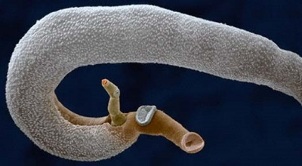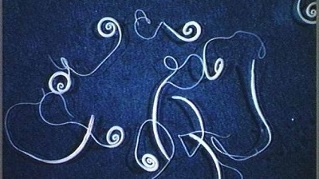Helminths are parasitic worms. To do this, middle and main hosts are used, which feed on cells or tissues, absorbing nutrients and vitamins that enter the body for the host. Worms in the human stomach, as well as in the intestines or other tissue structures, poison the body with toxic substances during their vital activity.
Types of parasites that enter the body through the stomach
Each type of parasite can develop in its inherent part of the human body, where the best conditions for its reproduction and nutrition are created. Certain types of parasites can move through the body from organ to organ. Parasite infection occurs in a variety of ways. The most common way parasites penetrate the human body is through food. Problems can be avoided by following basic hygiene rules - washing hands before eating, as well as thorough food handling.
Parasites do not live long in the human stomach due to the influence of hydrochloric acid on their membrane. The most common foreign microorganisms that parasitize in the human body are:
- Ascaris- have the ability to move through the channels of the liver and lung structures, penetrating the intestines. In the small intestine, roundworms develop into sexually mature individuals.
- Schistosomes- affect liver tissue, in advanced cases, causing the development of oncological diseases and dystrophy of the hepatobiliary system.
- Hookworms- cause disorders in the digestive tract. The most dangerous for the human body are hookworms and some. Localization of parasites mainly in the area of the duodenum. Hookworms can enter the human body not only through the stomach. Parasites have the ability to attack the skin, causing allergic reactions in the form of itching, burning and redness.
- Toxoplasma- the simplest parasites that often affect the human body. The disease progresses quite easily, often unnoticed by the person. Serious consequences for the body occur only in the case of severely weakened immunity.
- Broad tapeworm- localized in a small part of the human intestine. It can reach several meters in length. The parasite causes the development of a deficiency in the body of cyanocobalamin (vitamin B12), as well as folic acid. Toxic-allergic reactions of the organism are not excluded. The infection occurs when eating fish affected by larvae.
- Bovine tapewormis a worm that provokes the development of diseases such as teniarinchiasis. Penetrating into the human body in a dietary way, the bovine tapeworm parasite passes through the stomach, where it gets rid of the membranes under the action of gastric juice. Liberators are released, and the parasite can easily attach to the lining of the small intestine. Signs of bovine tapeworm in the body are abdominal pain, nausea and eruption of gastric contents. The patient loses appetite, may suffer from dyspeptic disorders (for example, belching). In some cases, infection with the bovine chain is a manifestation of allergic skin reactions in the form of urticaria.
- Pork tapewormis a helminth that reaches a size of up to 10 meters. It belongs to one of the largest worms that infect the human body. Passing through the stomach, the eggs of the parasite, due to the action of hydrochloric acid, lose their shell. The larvae that hatch from the eggs spread through all the tissues of the human body causing the development of cysticercosis. Cysticercosis is the greatest danger to the nervous system.
- Vlasoglav- a roundworm that causes trichocephaly. Symptoms of invasion may be absent for a long time. In complicated cases, with a large accumulation of parasites, there may be signs of ulcerative colitis or Crohn's disease. The person has abdominal pain, decreased appetite and the stool becomes runny. Strips of blood and mucus were recorded in the feces.


Symptoms of parasites and worms in the gastrointestinal tract
Foreign organisms that lead a parasitic lifestyle in the body of their host disrupt the work of many organs, causing inflammatory processes and severely destroying body tissues.
Parasitic individuals in the intestinal tract use nutrients from food intended for the host for their development and reproduction. The consequences for people are sad. The body experiences a serious lack of trace elements and vitamin complexes.
Children's organisms are the most endangered.
In the background of severe helminthiasis, the processes of growth and normal development, both physically and psychologically, are seriously disturbed. Helminths have the ability to adapt perfectly and live for decades in the body of the host. Helminth eggs have a pronounced resistance to environmental factors.
Because they are in the digestive tract, various types of helminthiasis can disrupt the digestive process by releasing specific toxic substances to protect them, inactivating enzyme activity. Helminthiasis can cause gastritis and other dyspeptic disorders.
Symptoms that occur during parasite infection can vary greatly in their manifestations. In the vast majority of clinical cases, discomfort and painful feelings are observed at the site of the parasite. Thus, helminths, whose habitat is the skin, damage the dermis, which leads to the appearance of allergic reactions. Parasites localized in the lung structures can cause a disturbing cough or difficulty breathing. Symptoms of dwarf tapeworm infection are manifested by weakness throughout the body, memory impairment, abdominal and head pain. Sometimes nausea and constant vomiting are diagnosed, as with a stomach ulcer.
Stool disorders, bad breath, intestinal pain, or digestive disorders are in most cases associated with the action of parasites in the digestive tract.
The effect of foreign microorganisms on the human body as a whole leads to the following symptoms:
- increased weakness;
- headache attacks;
- insomnia;
- bloating;
- rash and itching on the skin of allergic nature;
- bronchial asthma attacks.
In addition, the body's general resistance decreases in the background of changes in the functioning of the immune system. In young children, helminthiasis is manifested by a delay in physical and psychological development.
Diagnostics
Diagnostics combines studies to identify larvae or eggs of worms.
Biological materials for diagnosis are:
- feces;
- urine;
- sputum;
- duodenal contents;
- bile duct secretion;
- rectal scraping;
- smear from perianal space;
- muscle fibers;
- blood.
Based on the fact that helminths and their particles are detected by the macroscopic method, eggs and larvae can be detected only by laboratory examination with the help of a microscope.
Acute phase of helminthiasis caused by parasites in the tissues or larvae of parasitic forms of toxocariasis, trichinosis, cystocerciasis, trichocephaly, involves the use of serological samples, such as:
- RSK- complement fixation reaction;
- HA- indirect agglutination;
- ELISA- immunofluorescence analysis;
- AHL- lysis agglutination.
In some cases of helminthiasis, a reliable diagnosis can be established only with the help of special ultrasound examinations, computed tomography, X-ray examination and endobiopsy.
Treatment
The treatment of helminthiasis can vary greatly. Science knows more than 300 all types of helminthiases, but the main parasites that cause changes and systemic intoxication are round and flatworms. They are usually divided into intestinal and non-intestinal. When prescribing therapeutic measures, it is important to take into account a number of characteristic features that are characteristic only of a certain class of helminths harmful to human health.
To get rid of helminths, the specialist prescribes the whole treatment regimen, and it is important to take into account the factors of the frequency of infection of certain organs, the intensity of the infection, the degree of intoxication and the duration of helminthiasis. This allows you to prescribe the most effective means.
Medications
An individual treatment regimen is developed to combat the diagnosed type of helminth. The specialist prescribes the appropriate medication based on the results of the patient's examination.
Folk remedies
Traditional medicine can help you get rid of parasites at home.
You can use the following recipes to treat helminthiasis:
- Wormwood seed flowers,must be ground and mixed with honey. Take 1 teaspoon 3 times a day for 3 days in a row. Effective for ascariasis.
- Bitter wormwood infusionis prepared as follows - chop the grass, pour boiling water over it, let it cook all night. In the morning, filter the infusion and drink 3 times a day. The course of treatment is up to 3 weeks. Effective for ascariasis and enterobiasis.
- Pumpkin seeds.Can be used raw, dried or powdered. The powder is mixed with honey and the medicine is taken on an empty stomach. He faces worms. You can make a decoction of pumpkin seeds. A kilogram of seeds is chopped in a mortar, poured with 1, 5 liters of hot water and put in a water bath. No need to boil. Drink the soup on an empty stomach.
- Pomegranate peel infusion.Dried and crushed pomegranate peels, pour boiling water, cool and take 1 teaspoon 3-4 times a day. The course of therapy is 7 days.
Preventive measures
If the rules of personal hygiene are not followed, the parasites will have to be constantly removed from the body, which will negatively affect the condition of the body as a whole.
For prevention, it is important to adhere to the following basic hygiene rules:
- avoid close contact with animals;
- keep your hands clean - wash them after each outing;
- it is important to maintain cleanliness in the living room, perform wet cleaning, wash dishes with detergents;
- if there are children in the house, it is recommended to wash children's toys with soap, especially after a walk;
- Wash vegetables and fruits under running water, preferably warm or even hot, as worm eggs have a sticky substance that prevents them from separating from the surface;
- eat meat and fish products only after pre-heat treatment;
- drink clean water, avoid tap water, as it may contain lamblia and schistosomes.
Helminthiases not only cause discomfort but also greatly damage the human body. Neglected cases of helminth damage lead to disturbances in the work of the whole organism. It is important to take timely preventative measures to avoid infection.




























